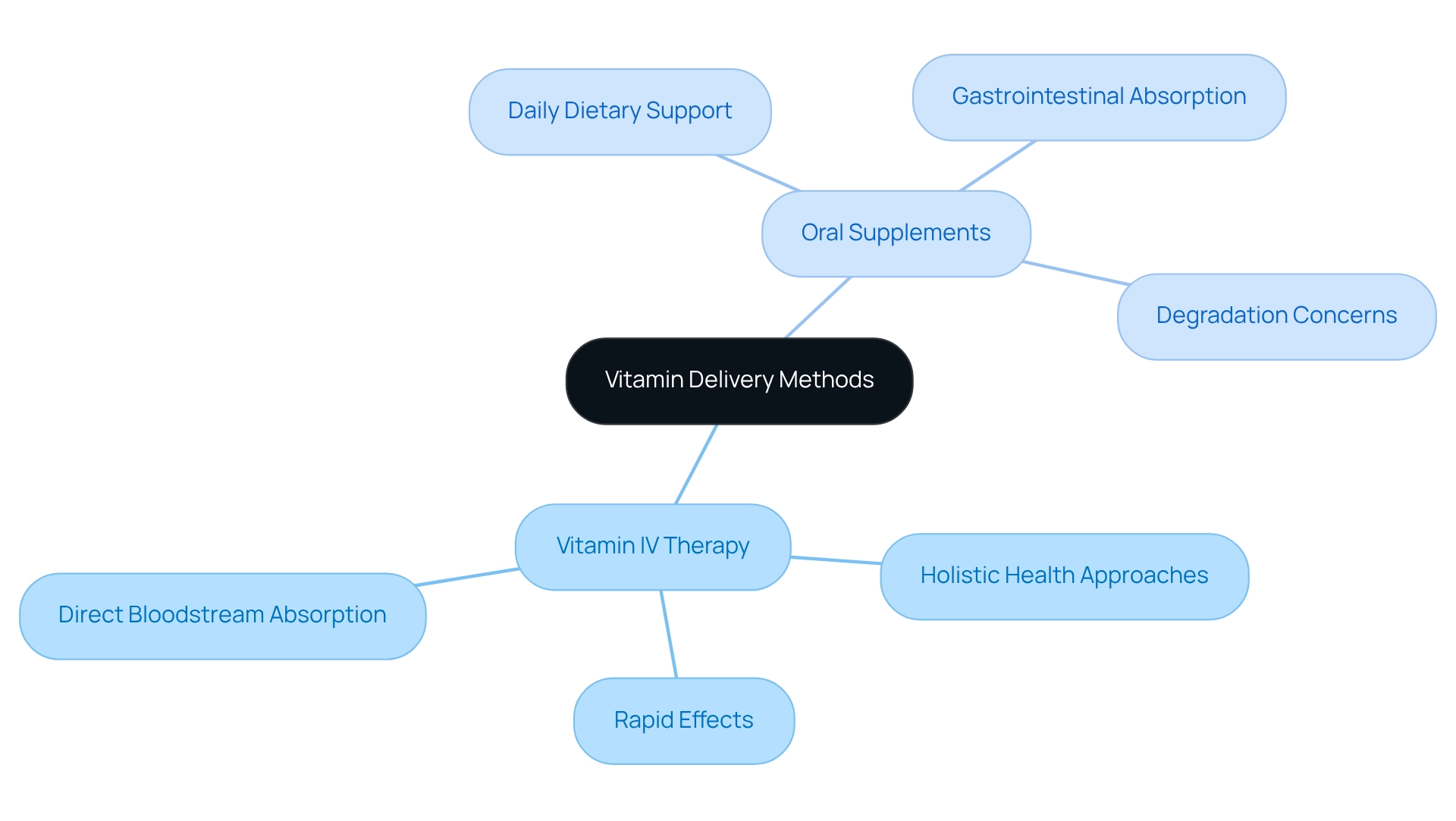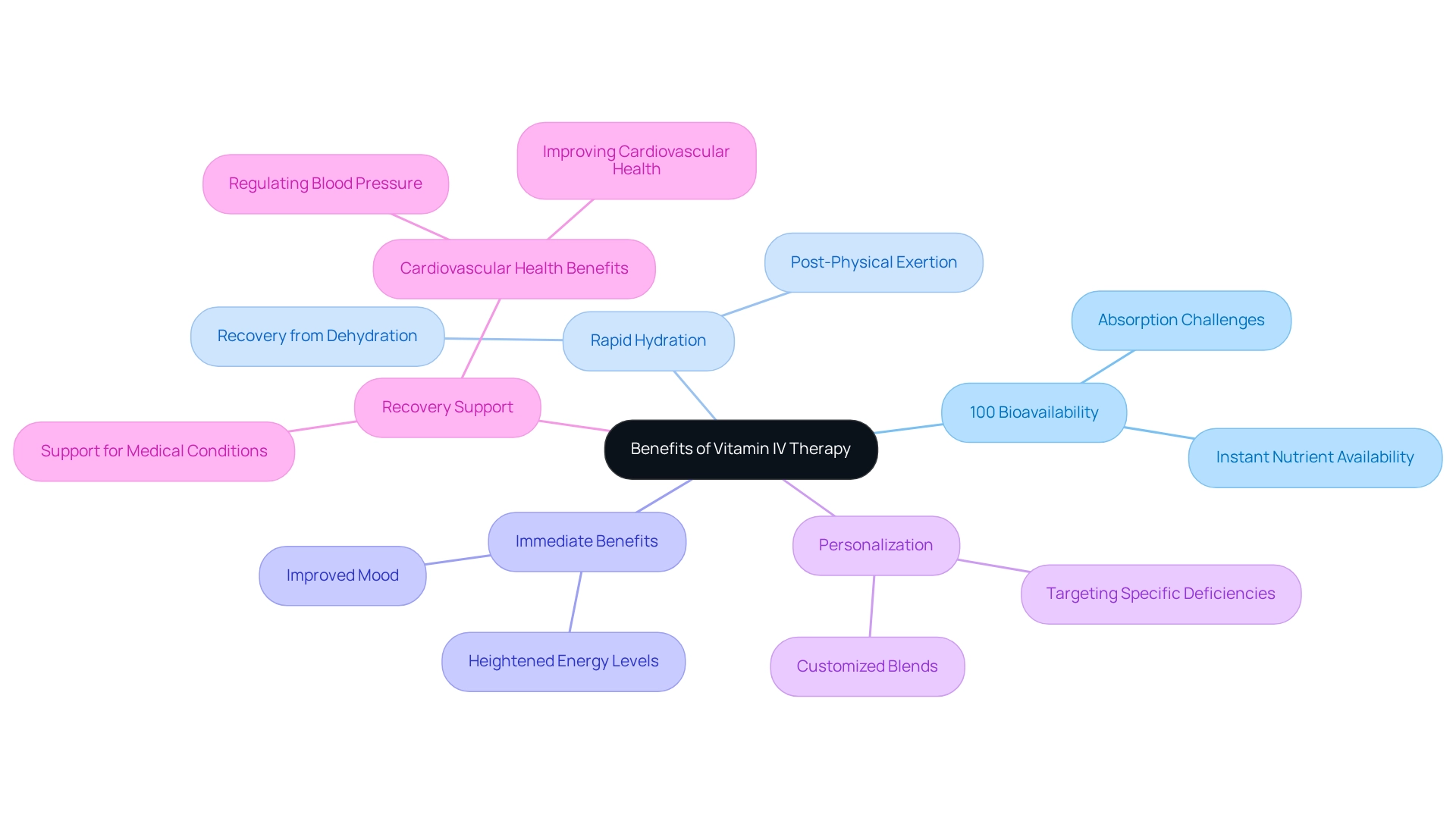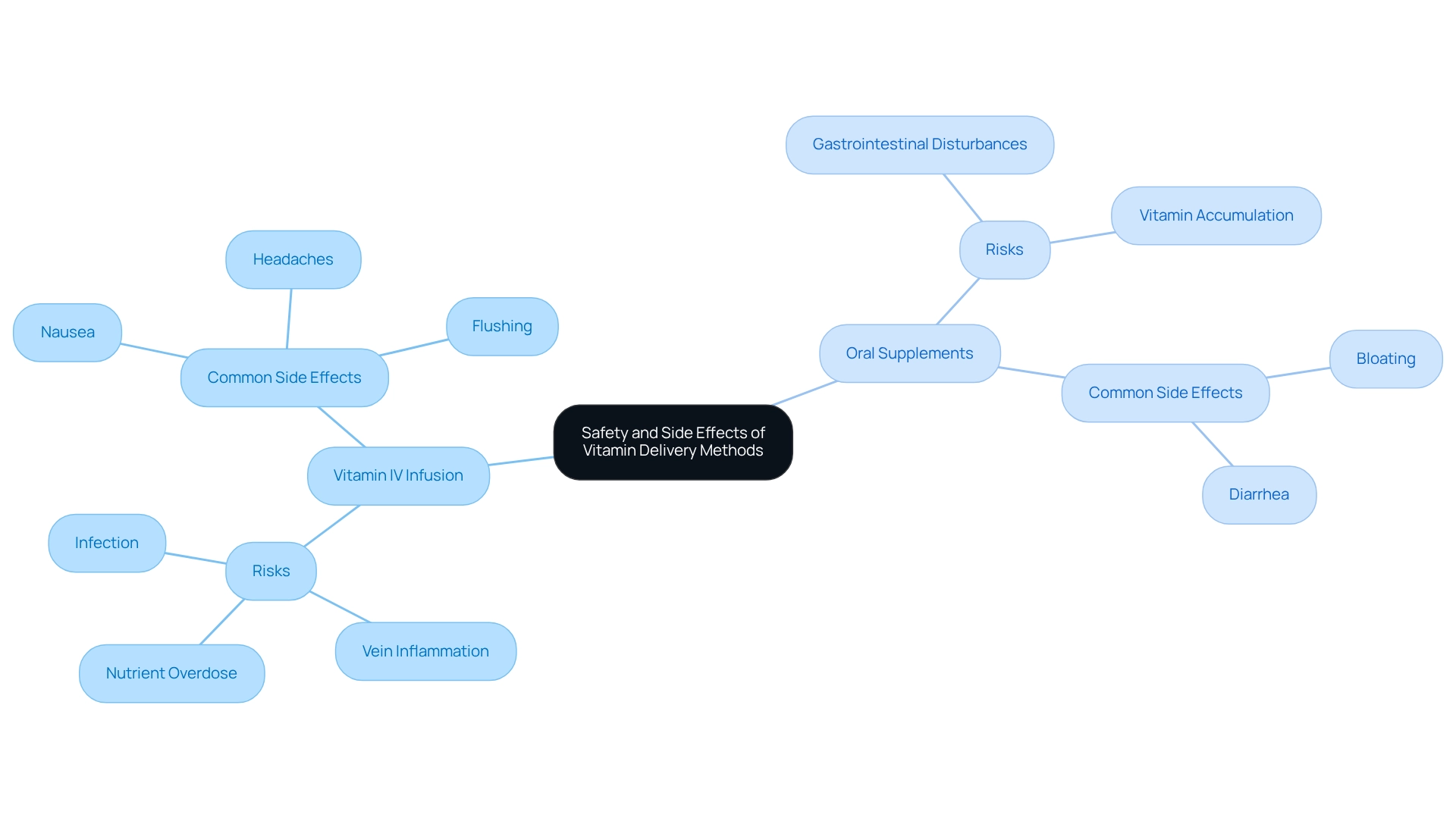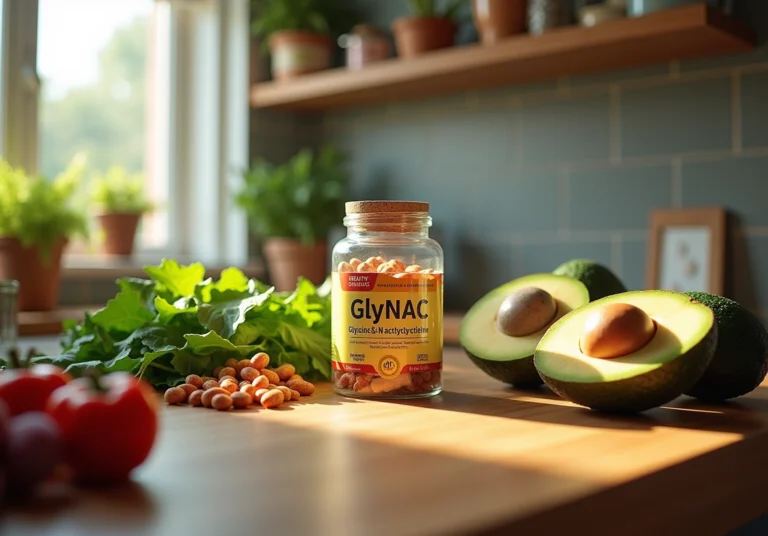Do Vitamin IVs Work? Comparing Benefits of IV Therapy and Oral Supplements
Overview
Vitamin IVs offer an effective solution for rapid nutrient absorption and hydration, making them particularly beneficial for individuals recovering from illness or facing absorption challenges. This therapy provides 100% bioavailability of nutrients and immediate effects, which stands in stark contrast to the variable absorption rates of oral supplements that must navigate the digestive system.
Furthermore, the use of IV therapy can significantly enhance recovery times and overall wellness. By delivering nutrients directly into the bloodstream, patients can experience the benefits almost instantly, which is crucial during periods of illness or nutritional deficiency.
In addition, considering the challenges some individuals face with oral supplementation, Vitamin IVs present a viable alternative that ensures essential nutrients are effectively utilized by the body. As a result, those seeking to improve their health and well-being should explore the potential of IV therapy as a part of their recovery strategy.
Introduction
In the quest for optimal health, individuals often find themselves at a crossroads between two popular nutritional strategies: vitamin IV therapy and oral supplements. Each method presents unique advantages and drawbacks that can significantly impact overall wellness. While IV therapy promises rapid nutrient absorption directly into the bloodstream—bypassing the digestive hurdles that can hinder effectiveness—oral supplements offer a more accessible and familiar approach for daily nutritional support. As the wellness landscape evolves, understanding the nuances between these two options becomes essential for making informed health decisions.
This exploration delves into the mechanisms, benefits, and potential risks associated with both vitamin IV therapy and oral supplementation. It equips readers with the knowledge to choose the best path for their individual health needs.
What are the specific benefits of each method? How can individuals determine which option aligns best with their lifestyle? By addressing these questions, we aim to provide clarity and actionable insights for those navigating their health journeys.
Understanding Vitamin IV Therapy and Oral Supplements
Many people wonder, do vitamin IVs work, as this treatment delivers vitamins and minerals directly into the bloodstream via an intravenous drip, allowing for quick absorption and bypassing the digestive system, which can hinder nutrient intake. In contrast, oral supplements must navigate the gastrointestinal tract, where they may face degradation and variable absorption rates.
While oral products are commonly used for daily dietary support, IV administration is often recommended for its rapid effects, particularly in clinical or wellness settings where swift replenishment is essential. This distinction is crucial for assessing the benefits and applications of both methods in promoting well-being, as recent research raises the question of do vitamin IVs work, suggesting that intravenous treatment can significantly enhance the absorption of nutrients and is a preferred choice for individuals recovering from illness or surgery.
The rising popularity of IV treatments in wellness centers and spas highlights a shift towards holistic health approaches, prioritizing the immediate delivery of vital substances. As noted by AZ IV Medics, ‘Whether you require hydration, immunity, recovery, or performance assistance, AZ IV Medics’ mobile IV treatment delivers the highest-quality vitamins and minerals directly to you — with exceptional absorption assured.’
Additionally, the Hydration Boost IV, designed for rapid hydration and replenishment of essential nutrients, incorporates electrolytes, fluids, and minerals, showcasing the tangible benefits of IV treatment. Experts in the field emphasize that while oral supplements serve as valuable daily aids, they often question do vitamin IVs work for providing superior absorption and faster results, especially in critical health scenarios. Understanding these differences empowers individuals to make informed decisions about their nutritional strategies.

Evaluating the Benefits of Vitamin IV Therapy
Vitamin IV treatment offers a variety of notable benefits. One of its primary advantages is the provision of 100% bioavailability of nutrients, ensuring that all administered vitamins and minerals are instantly available for the body’s use. This feature is particularly advantageous for individuals facing absorption challenges or those recovering from illness. Moreover, the effects of IV treatment may be more pronounced for individuals who are dehydrated, nauseated, or feeling unwell, making it a crucial option in such scenarios.
In addition, IV treatment facilitates rapid hydration, which is essential for recovery from dehydration or after intense physical exertion. Users frequently report immediate benefits, including heightened energy levels and improved mood. The ability to personalize IV treatment allows for the development of customized blends that target specific deficiencies or wellness goals. As noted, “Your IV package can be altered to meet certain requirements,” reinforcing the personalization aspect of this treatment.
This tailored method not only enhances overall well-being but also aids recovery from various medical conditions, as evidenced by case studies emphasizing the cardiovascular advantages of specific nutrients in intravenous treatments. By offering these insights, the discussion on whether do vitamin IVs work emerges as a valuable choice for those pursuing effective wellness solutions, aligning with the aim of making informed decisions regarding supplementation.

Assessing the Pros and Cons of Oral Supplements
Oral products present a widely accessible and convenient choice for daily nutritional support, available in forms such as tablets, capsules, and powders. This versatility allows individuals to seamlessly integrate them into their daily routines. However, the effectiveness of these products can be influenced by several factors, including digestive health, the presence of food, and individual metabolic differences. For example, certain nutrients, particularly vitamin B12 and vitamin C, may not be fully absorbed through the digestive tract, which raises the question of do vitamin IVs work better than oral intake.
Furthermore, there is a risk of overindulgence, as individuals often consume various products without professional guidance, which can lead to toxicity or negative interactions. Recent statistics suggest that although oral nutritional products (ONS) can aid well-being, they demonstrated no beneficial impact on carbohydrate consumption, with a standardized mean difference of 0.76. This emphasizes the necessity for thoughtful evaluation of their application.
Despite these drawbacks, oral supplements remain an economical and practical option for many individuals seeking to improve their dietary intake. They provide an accessible means to address nutritional gaps, especially for those who may struggle to meet their dietary needs through food alone. As pointed out by Pishva Arzhang, “The current meta-analysis indicates a positive impact of ONS in older adults in preventing unwanted weight loss and enhancing handgrip strength linked to improved well-being outcomes.”
In contrast, IV treatment offers a direct method of delivering nutrients into the bloodstream, which makes many wonder do vitamin IVs work in potentially leading to higher absorption rates and immediate effects. This method has gained popularity, particularly among those seeking anti-aging benefits, as it raises the question of do vitamin IVs work by bypassing digestive limitations. Incorporating knowledge from the Hunza people’s eating habits, recognized for their longevity and well-being, can further enhance the discussion on the efficacy of both oral products and IV therapy. Their focus on whole foods and nutrient-rich diets underscores the significance of quality nutrition in enhancing wellness and longevity.
Additionally, a case study evaluating the effect of ONS on preoccupation with food revealed that supplementation can increase thoughts about food, indicating a potential psychological effect. As with any health strategy, it is essential to assess individual health conditions and consult with healthcare experts to enhance the use of nutritional aids.

Analyzing Safety and Side Effects of Both Methods
Both vitamin IV infusion and oral supplements present distinct safety considerations that warrant careful evaluation. IV treatment, while often effective for rapid nutrient delivery, poses risks such as infection at the injection site, vein inflammation, and the potential for nutrient overdose, particularly when administered without medical oversight. A case study on the side effects of IV vitamin treatment highlights that, in addition to the risks of vitamin overload, individuals with low magnesium or potassium levels are at higher risk for abnormal heart rhythms. Moreover, those with heart issues may face fluid overload complications. Common side effects reported include nausea, headaches, and flushing.
In contrast, oral supplements can lead to gastrointestinal disturbances, including bloating and diarrhea, especially when consumed in excess. Furthermore, certain vitamins, particularly fat-soluble ones like A, D, E, and K, can accumulate in the body, leading to toxicity. Statistics indicate that participants receiving IV treatment reported significant improvements in pain, depression, and overall quality of life after eight weeks, leading to the inquiry of do vitamin IVs work. Yet, safety concerns remain paramount. The high cost of IV treatment, often not covered by insurance, makes it less accessible, prompting a recommendation for more affordable and healthier alternatives.
Consulting healthcare professionals before initiating any supplementation regimen is crucial to mitigate these risks and ensure safe usage, particularly in light of potential interactions with existing medications. What steps can you take to prioritize your health? Explore further resources to make informed decisions about supplementation.

Choosing Between Vitamin IV Therapy and Oral Supplements
When selecting between vitamin IV treatment and oral supplements, it is crucial to evaluate personal health requirements, lifestyle, and budget. Here are some key considerations:
Vitamin IV Therapy
- Benefits: Particularly beneficial for those requiring rapid nutrient replenishment, such as athletes, individuals recovering from illness, or those with absorption challenges. Studies have demonstrated that IV treatment can significantly enhance hydration and relieve symptoms for COVID long haulers, leading to inquiries about do vitamin IVs work in acute situations. Furthermore, dietary aids such as vitamin C, B vitamins, and magnesium can promote overall health and vitality, enhancing IV therapy for better outcomes. My personal experience with these supplements has shown noticeable improvements in energy levels and recovery times.
- Risks: Possible dangers include infection at the injection site and negative reactions to the substances administered. Consulting with a healthcare provider is crucial to ensure safety.
Oral Supplements
- Benefits: Offer a convenient and cost-effective solution for maintaining nutrient levels over time, making them suitable for those looking for a long-term approach to health. According to market analysis, North America represented a significant 33% of the dietary products revenue share in 2023, indicating a growing preference for these items. Many commonly utilized products, such as omega-3 fatty acids and coenzyme Q10, are supported by scientific evidence endorsing their role in anti-aging and overall wellness. My personal use of these products has led to enhanced joint well-being and cognitive performance.
- Risks: Overconsumption can lead to toxicity, and some individuals may experience gastrointestinal discomfort. It’s important to choose high-quality supplements and consult with a healthcare provider.
As wellness coach insights suggest, understanding the nuances of nutrient replenishment methods, including whether do vitamin IVs work, can empower individuals to make informed choices that best suit their unique circumstances. Additionally, as Jack LaLanne famously stated, “Exercise is king; nutrition is queen. Put them together and you’ve got a kingdom.” This highlights the significance of merging both exercise and nutrition for optimal well-being.
Moreover, Bethenny Frankel’s analogy likening diet options to investments in a bank account provides a relatable framework for considering the long-term advantages of wellness choices, especially when choosing between IV therapy and oral supplements. Consulting with a healthcare provider can yield personalized recommendations, ensuring that the chosen supplementation method aligns with individual health goals.

Conclusion
The comparison between vitamin IV therapy and oral supplements reveals distinct pathways to achieving optimal health. Vitamin IV therapy offers rapid nutrient absorption, making it particularly advantageous for those in need of immediate replenishment, such as individuals recovering from illness or athletes requiring quick hydration. Its 100% bioavailability ensures that nutrients are delivered effectively, leading to noticeable improvements in energy and overall well-being. However, this method is not without risks, including potential side effects and the necessity of professional oversight.
Conversely, oral supplements provide a convenient and cost-effective means of supplementing nutrition over time. They are widely accessible and can be easily integrated into daily routines, catering to those looking for a long-term health strategy. While they may not offer the same immediate benefits as IV therapy, they still play a crucial role in addressing nutritional gaps for many individuals. Nonetheless, caution is advised regarding overconsumption and the potential for gastrointestinal disturbances.
Ultimately, the choice between vitamin IV therapy and oral supplements should be informed by individual health needs, lifestyle preferences, and budget considerations. Consulting with healthcare professionals can help tailor the approach to personal health goals, ensuring safety and efficacy in nutrient replenishment. As the wellness landscape continues to evolve, understanding these options empowers individuals to make informed decisions on their health journeys, combining effective nutrition and overall wellness for a balanced lifestyle.
Frequently Asked Questions
What are vitamin IVs and how do they work?
Vitamin IVs are treatments that deliver vitamins and minerals directly into the bloodstream via an intravenous drip, allowing for quick absorption and bypassing the digestive system.
How do vitamin IVs compare to oral supplements?
Oral supplements must navigate the gastrointestinal tract, which can hinder nutrient absorption due to degradation and variable absorption rates. In contrast, vitamin IVs provide 100% bioavailability of nutrients, ensuring immediate availability for the body.
In what scenarios are vitamin IVs particularly beneficial?
Vitamin IVs are especially beneficial for individuals recovering from illness or surgery, those who are dehydrated, nauseated, or feeling unwell, as they facilitate rapid hydration and provide quick replenishment of essential nutrients.
What are some reported benefits of vitamin IV treatments?
Users frequently report immediate benefits such as heightened energy levels and improved mood. Additionally, IV treatments can be personalized to target specific deficiencies or wellness goals.
Why is the personalization of vitamin IV treatments important?
Personalization allows for the development of customized blends that meet specific health requirements or wellness goals, enhancing overall well-being and aiding recovery from various medical conditions.
What is the significance of the rising popularity of vitamin IV treatments?
The increasing popularity of vitamin IV treatments in wellness centers and spas reflects a shift towards holistic health approaches, prioritizing the immediate delivery of vital substances for overall wellness.






